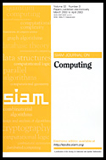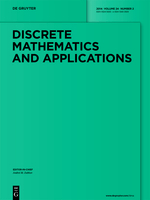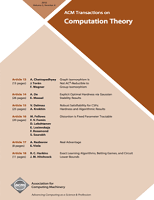
DISCRETE MATHEMATICS AND THEORETICAL COMPUTER SCIENCE
metrics 2024
Innovating Research in Discrete Structures and Computational Theory
Introduction
DISCRETE MATHEMATICS AND THEORETICAL COMPUTER SCIENCE, published by DISCRETE MATHEMATICS THEORETICAL COMPUTER SCIENCE in France, stands as a significant open-access journal since 1997, publishing innovative research articles within the intersecting disciplines of discrete mathematics and theoretical computer science. With an ISSN of 1462-7264 and an E-ISSN of 1365-8050, this journal aims to provide a platform for scholarly discourse and dissemination of knowledge, making it accessible to a global audience. It is recognized for its contributions, achieving a Q2 ranking in both Computer Science (Miscellaneous) and Discrete Mathematics and Combinatorics, alongside a Q3 ranking in Theoretical Computer Science as of 2023. The journal’s rigorous selection process ensures that only high-quality research is published, promoting advancements in these critical areas of study. Researchers, professionals, and students alike can benefit from its comprehensive articles that not only enhance theoretical understanding but also foster practical applications in the ever-evolving landscape of computer science.
Metrics 2024
 0.50
0.50 0.50
0.50 0.50
0.50 25
25Metrics History
Rank 2024
Scopus
IF (Web Of Science)
JCI (Web Of Science)
Quartile History
Similar Journals

SIAM JOURNAL ON COMPUTING
Elevating Computational Theories for a Brighter Future.Welcome to the SIAM Journal on Computing, a premier publication of SIAM Publications dedicated to advancing the field of computational science. Established in 1984, this journal provides a platform for groundbreaking research and theoretical advancements that shape the landscape of both Computer Science and Mathematics. With an impressive impact factor and consistently ranking in Q1 quartiles for its categories, the journal remains an essential resource for scholars looking to contribute to innovative computational theories and methodologies. Although not currently an open-access journal, the SIAM Journal on Computing offers rigorous peer-reviewed articles, ensuring high-quality contributions that appeal to researchers, professionals, and students alike. As we converge towards 2024, this journal continues to play a vital role in influencing future research directions and fostering an academic community devoted to the exploration of computational challenges. Join us in exploring the forefront of computing research!

Discrete Mathematics and Applications
Transforming Ideas into Applications in Discrete Mathematics.Discrete Mathematics and Applications, published by WALTER DE GRUYTER GMBH, is a vital academic journal catering to the expansive fields of Discrete Mathematics and Applied Mathematics. With an ISSN of 0924-9265 and an E-ISSN of 1569-3929, it serves as a reputable platform for disseminating innovative research and developments within these domains. The journal has been contributing to the academic landscape since its inception in 1991 and continues to actively publish impactful studies through 2024. Despite its current positioning in Q4 of both the Applied Mathematics and Discrete Mathematics and Combinatorics categories, the journal is dedicated to fostering essential discussions that advance understanding and application of discrete mathematical concepts. It provides researchers, professionals, and students with access to a wealth of knowledge, encouraging collaboration and growth within the field. With its strategic German headquarters in Berlin and a focused aim to enhance the visibility and significance of discrete mathematics in real-world applications, Discrete Mathematics and Applications stands out as an important resource for those seeking to contribute to the ongoing evolution of mathematical sciences.

ACM Transactions on Computation Theory
Exploring the Foundations of Theoretical Computer Science.ACM Transactions on Computation Theory, published by the Association for Computing Machinery, is a prestigious journal dedicated to advancing the field of computation theory and theoretical computer science. With an ISSN of 1942-3454 and an E-ISSN of 1942-3462, this journal serves as a vital resource for researchers and professionals seeking to explore groundbreaking developments in computational models, algorithms, and their mathematical foundations. The journal's rigorous standards have earned it a significant position within the academic community, as evidenced by its 2023 category quartiles, ranking in the Q1 category for Computational Theory and Mathematics and Q2 for Theoretical Computer Science. Although it operates through traditional subscription access, it maintains a critical role in disseminating cutting-edge research and fostering collaboration among experts in the United States and beyond. As an influential platform, ACM Transactions on Computation Theory is committed to contributing to the ongoing dialogue and advancement of computation theory, making it essential reading for anyone passionate about this dynamic field.

Australasian Journal of Combinatorics
Unlocking the Secrets of Combinatorial ComplexityThe Australasian Journal of Combinatorics, published by the CENTRE DISCRETE MATHEMATICS & COMPUTING, serves as a vital platform for researchers and professionals engaged in the dynamic field of discrete mathematics and combinatorics. With an ISSN of 2202-3518 and an E-ISSN of the same, this journal has been committed to open access since 2014, ensuring that groundbreaking research is readily available to a global audience. Based in Australia, specifically at the Department of Mathematics, University of Queensland, this journal spans the years from 1996 to 2024, showcasing the evolution of combinatorial research over nearly three decades. Recognized in the 2023 category quartiles as Q3 in Discrete Mathematics and Combinatorics, it ranks 68th out of 92 in Scopus, reflecting its growing influence despite its current percentile of 26th. The Australasian Journal of Combinatorics is dedicated to fostering innovative research and theoretical development, making it a valuable resource for academics and students alike.

DISCRETE & COMPUTATIONAL GEOMETRY
Exploring the Intersection of Mathematics and Computer ScienceDISCRETE & COMPUTATIONAL GEOMETRY is a prestigious journal published by Springer, specializing in the fields of computational geometry, discrete mathematics, and theoretical computer science. With its ISSN 0179-5376 and E-ISSN 1432-0444, this journal has established itself as a key resource for researchers and professionals, offering a platform for the dissemination of high-quality research from 1986 to 2024. Recognized for its impact in the academic community, it currently holds a Q2 ranking in several important categories, including Computational Theory and Mathematics, Discrete Mathematics and Combinatorics, Geometry and Topology, and Theoretical Computer Science. Although it is not an open-access journal, the rigorous peer-review process ensures that published articles meet the highest standards of scientific integrity and scholarship. With Scopus rankings reflecting its influence—placing it in the 72nd percentile for Geometry and Topology and 62nd for Discrete Mathematics—it serves as an essential reference for students and scholars seeking to deepen their understanding of complex geometric and combinatorial theories.

GRAPHS AND COMBINATORICS
Unveiling the complexities of graph theory for a global audience.GRAPHS AND COMBINATORICS, published by SPRINGER JAPAN KK, is a premier academic journal dedicated to advancing the field of discrete mathematics and combinatorial theory. ISSN 0911-0119 and E-ISSN 1435-5914 signify its scholarly accessibility, providing a platform for the dissemination of cutting-edge research from 1985 to the present. With a 2023 quartile ranking of Q2 in Discrete Mathematics and Combinatorics and Q3 in Theoretical Computer Science, the journal showcases influential studies that significantly contribute to these domains. Situated in Tokyo, Japan, it harnesses a global perspective on contemporary mathematical challenges. Although lacking open access options, GRAPHS AND COMBINATORICS remains a vital resource for researchers, professionals, and students seeking to deepen their understanding of mathematical graph theory and combinatorial structures. Engage with its significant findings and join the discourse that shapes future research and applications in these inspiring fields.

Advances and Applications in Discrete Mathematics
Advancing Theory and Practice in Discrete MathematicsAdvances and Applications in Discrete Mathematics, published by PUSHPA PUBLISHING HOUSE, is a premier journal dedicated to the flourishing field of discrete mathematics. With a focus on both the theoretical aspects and practical applications, this journal serves as a valuable resource for researchers, professionals, and students aiming to explore cutting-edge developments in areas such as combinatorics, graph theory, and algorithms. Although specific impact factors have yet to be established, its commitment to quality scholarship is reflected in its rigorous peer-review process, ensuring that published articles meet high academic standards. The journal encourages open access to disseminate knowledge effectively, fostering collaboration and innovation within the discrete mathematics community. As a vital platform for researchers wishing to contribute to this dynamic field, Advances and Applications in Discrete Mathematics plays a critical role in promoting advancements and applications that are essential to both theoretical exploration and practical problem-solving.

COMBINATORICA
Advancing the Frontiers of Discrete MathematicsCOMBINATORICA, published by Springer Heidelberg, is a leading international journal dedicated to advancing the fields of Discrete Mathematics and Combinatorics. With an illustrious history dating back to 1981 and a remarkable commitment to excellence, this journal has earned its place in the highest echelons of academic publishing, currently ranked in the Q1 category for both Computational Mathematics and Discrete Mathematics and Combinatorics. Located in Germany and recognized for its high-quality research contributions, COMBINATORICA fosters innovative discussions and disseminates significant findings that shape contemporary mathematical theory. Although it does not offer Open Access options, its rigorous peer-review process ensures that each publication meets the highest scholarly standards, making it an essential resource for researchers, professionals, and students engaged in mathematical sciences. With an impactful H-Index reflecting its citation influence, COMBINATORICA continues to be a pivotal platform for groundbreaking research in combinatorics and its applications.

Annals of Combinatorics
Connecting Theory with Practical ApplicationsAnnals of Combinatorics, published by Springer Basel AG, serves as a premier platform for innovation and research in the field of discrete mathematics and combinatorics. With an ISSN of 0218-0006 and an E-ISSN of 0219-3094, the journal captures the ongoing developments and breakthroughs that characterize this dynamic discipline, which plays a crucial role in various applications such as computer science, optimization, and statistical mechanics. The journal has been recognized as part of the Q2 category in the 2023 rankings for discrete mathematics and combinatorics, reflecting its significant contribution to the academic community. Researchers and educators alike benefit from its insightful articles that not only cover theoretical advancements but also practical implications. With convergence years spanning from 2005 to 2024, the Annals of Combinatorics continues to be an essential resource for anyone looking to deepen their understanding and explore new frontiers in combinatorial research.

Prikladnaya Diskretnaya Matematika
Advancing the Frontiers of Applied Mathematics.Prikladnaya Diskretnaya Matematika, published by the PUBLISHING HOUSE SCIENTIFIC & TECHNICAL LITERATURE in the Russian Federation, serves as a vital resource for scholars and practitioners in the realms of applied mathematics, computational theory, and discrete mathematics. With an ISSN of 2071-0410 and an E-ISSN of 2311-2263, this journal has been actively contributing to the academic discourse since its inception in 2016, with expectations to continue until at least 2024. Although currently positioned in the Q4 category across several disciplines—including applied mathematics, computational theory, and signal processing—this journal offers a unique opportunity for researchers to contribute to an evolving field, despite facing competitive rankings in the Scopus database. The open access nature of the journal reflects a commitment to disseminating knowledge broadly, albeit details regarding access options remain unspecified. As a publication dedicated to fostering innovation and collaboration in theoretical and practical applications, Prikladnaya Diskretnaya Matematika plays an important role in advancing mathematical theories and practices, making it pertinent for those engaged in research and application within these critical domains.